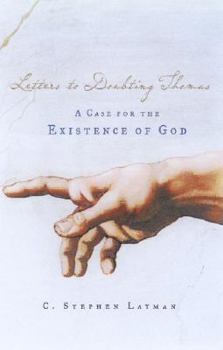Letters to Doubting Thomas: A Case for the Existence of God
Select Format
Select Condition 
Book Overview
When people encounter an argument for or against God's existence, it often raises more questions than it answers. In Letters to Doubting Thomas, C. Stephen Layman offers a fresh, insightful approach to the issue of God's existence--a way to organize what can seem like a blizzard of claims and concepts--bringing clarity to a debate often mired in confusion.
Layman explores the evidence for the existence of God in a series of fictionalized letters...
Format:Hardcover
Language:English
ISBN:019530814X
ISBN13:9780195308143
Release Date:October 2006
Publisher:Oxford University Press
Length:288 Pages
Weight:1.00 lbs.
Dimensions:1.0" x 5.9" x 8.3"
Customer Reviews
2 ratings
Layman Doesn't Know the Proof of God's Existence
Published by Thriftbooks.com User , 17 years ago
I'll begin my critique of Layman's book is with the following quote (This is an abridgment of a review on my website.): "Just as a contingent truth is true but might have been false, so a contingent being is one that does exist but might not have. And suppose we claim, with regard to any contingent being, that it exists, e.g.,"I (Zach) exist" or "You (Thomas) exist." Such propositions are contingent truths, not necessary ones. More generally, we can state the relationship between contingent beings and contingent truths as follows: A being is contingent if (and only if) every proposition affirming its existence is a contingent truth. (p. 85)" Not in the above quote, nor anywhere else in the book, does he say that humans are finite beings and that God is an infinite being. I agree that humans are contingent beings, but this is not as clear and unmistakably true as the proposition that humans are finite beings: Zach exists and Thomas exists, but Zach is not Thomas and Thomas is not Zach. Zach and Thomas are different beings, that is, finite beings. God is a being that is not finite. A finite being needs a cause outside of itself whereas an infinite being can be the reason for its own existence. Since the universe would be unintelligible if every being needed a cause, there must be at least one infinite being. QED. Layman is butting heads with the Roman Catholic Church and St. Paul as can be seen from the following quote from the Baltimore Catechism: "22. Can we know by our natural reason that there is a God? We can know by our natural reason that there is a God, for natural reason tells us that the world we see about us could have been made only by a self-existing Being, all-wise and almighty. For the wrath of God is revealed from heaven against all ungodliness and injustice of those men that detain the truth of God in injustice; because that which is known of God is manifest in them. For God hath manifested it unto them. (Romans 1:18-19)" The use of the word "know" and the phrase "wrath of God" constitutes a criticism of the character of naturalists, atheists, and agnostics. Layman says it's the best explanation without criticizing those who disagree. One of Layman's arguments is that the "theistic hypothesis" gives a better explanation for the fact than humans have free will than naturalism, the philosphy that there is no supernatural being. Layman begins his argument by attempting to define free will: "Free will is traditionally characterized as the power to do otherwise than one in fact does. Let's say you recently voted in a meeting by raising your right arm. If you performed this action freely, then you had the power to do otherwise, to refrain from raising your right arm. If you have free will, then when you face a decision between incompatible courses of action (such as speaking and refraining from speaking), although you cannot take more than one of them, each of them is within your power. Another way to put it: If you have free
Demanding but rewarding
Published by Thriftbooks.com User , 18 years ago
In a day and age where sound bytes and cliches dominate it's nice to see a book that really makes you think. If you don't have much of a background in philosophy the book can seem daunting at times but as with all things worthwhile in the end hard work is rewarded. The author focuses his book on the issue of whether Naturalism or Theism is a better explanation of reality. In my opinion each hypothesis has its good and bad points. I don't think in the end there is a clear winner but at least I have a much better understanding of how to evaluate these two positions.






